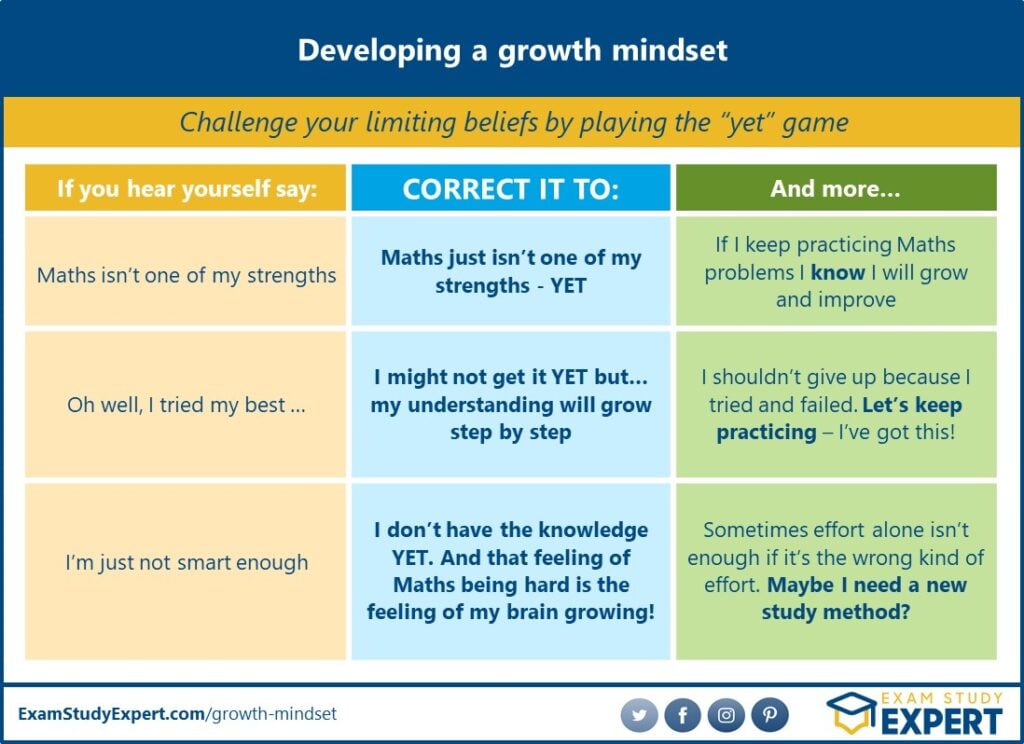The mindset you have going through life is important. The goal: a mindset that bouys you up and propels you forward to ever greater heights: a growth mindset.
So to help you achieve just that, we’re going to explore what a growth mindset is, how to develop one and how to nurture one in your children!
By Dr Kerri-Anne Edinburgh, our Cambridge University educated specialist in study skills, mindset, research and writing. As Head Writer and Editor for the popular Exam Study Expert blog since 2021, Kerri has spent over three years immersed in the psychology of learning, ensuring each article is packed with valuable insights, practical tips and helpful graphics.
Article review by William Wadsworth
Our mission is to provide high quality content to help students reach their academic goals with a healthy, sustainable approach. To ensure our articles meet that high standard, we follow a rigorous editorial process from research right through to editing and correcting errors. To learn more, please see our Editorial Policy.
What kind of mindset is best?
Let’s face it: your mindset has a big effect on your learning, life and achievements. It affects how you handle challenges and setbacks, and what you truly believe about yourself and your abilities.
Recent psychological research has identified two primary contrasting mindsets: growth and fixed. So let’s dive in and explore them both:
What is a growth mindset?
Put simply, a growth mindset is the belief that your abilities, skills and intelligence can be continually developed through hard work and effort. With this mindset, your talents are just a starting point, not a limitation.
The term “growth mindset” was first coined by renowned psychologist Dr Carol Dweck in her seminal book Mindset: The new psychology of success (2006). (To grab a copy of the updated version of Mindset, click here!)
Let’s start with one important fact about growth mindset: everyone can develop a growth mindset: children, students, and adults alike.

People with a growth mindset are more likely to embrace challenges, persist in the face of obstacles, enjoy putting in the effort, learn from criticism, and find inspiration in others’ successes.
Students who embrace a growth mindset understand the value of effort and persistence in reaching for their goals. This mindset encourages resilience, independence and can lead to a lifetime desire to learn.
In Mindset, Dweck writes:
“The passion for stretching yourself and sticking to it, even (or especially) when it’s not going well, is the hallmark of the growth mindset. This is the mindset that allows people to thrive during some of the most challenging times in their lives.”
Here’s the caveat: growth mindset isn’t just about being flexible or having a positive attitude or an open mind. Dweck and her colleagues call this misconception “false growth mindset”.
Developing a growth mindset can be hard work, and not easy to attain – but its worth it!
What is a fixed mindset?
In contrast, someone with a fixed mindset believe that their intelligence and abilities are static and innate. With this mindset people struggle with inertia and criticism, and feel intimidated by the success of others.
A fixed mindset leads to negative thinking, such as: “some people are talented, and some are not”, or “I am what I am and I can’t (significantly) change that”. A failure becomes “I’m not smart enough” rather than “I haven’t practiced enough”.
This is not helpful! Instead of the desire to become smarter, a fixed mindset causes people to want to look smart, because they feel they are not. They lose the desire to grow, avoid challenges, hide their flaws and fear being judged. Their abilities plateau early in life, and they may achieve les than their full potential.
All of this confirms a deterministic view of the world and themselves: it’s a vicious cycle of believing you are unchangeable.
Your mindset and your brain
The great news is that it’s not just your mindset that can change: your brain is really flexible! Your brain is constantly changing and evolving – and not just in childhood.
With the right kind of practice, your brain can make new connections, and strengthen existing ones: this can even change the way your brain looks.

For example:
Studies have shown that the brains of London taxi drivers (who are trained to navigate a sprawling 2,000-year-old city without a map) actually have an increased area for dealing with memory and navigation!
Were they born that way? Of course not: it grew and strengthened with years of training and practice. And everyone’s brain is capable of this!
What’s more, research has shown that teaching students about neuroscience and brain malleability promotes growth mindset.
The mindset you have is fluid and ever-changing
It’s important to remember that your mindset isn’t set in stone – you don’t either have a fixed mindset or growth mindset and that’s it.
(In fact, Dweck emphasises that there is no such thing as a “pure” growth mindset – important to remember as we work to improve ourselves!)
You may have a growth mindset in some situations, and a fixed mindset in others. This mixture will change based on your experiences, feedback and development, and will be continually evolving.
Some situations may trigger a fixed mindset, especially in unhelpful workplace and learning environments, or faced with criticism and challenges. Dweck suggests that identifying and working with these triggers help you to “remain in a growth zone”.
What are the benefits of a growth mindset?
The benefits of a growth mindset are plentiful. You can learn to:
- Embrace a lifelong desire to learn
- Reflect on your experiences and learn from them
- Accept feedback and build on criticism as a useful source of information
- Believe your intelligence can be improved
- Come up with strategies for improving your work and skills
- Stay motivated in the face of challenges
- Learn to operate just outside of your comfort zone (where all the good learning happens!)
- Find it easier to develop new interests
- See others’ successes as a source of inspiration, not competition
- Understand that not knowing or being good at something is a temporary state
Reacting to failures
With a growth mindset, you know that failures don’t have to define you. They might still be painful, sure, but they become a learning experience, something temporary and changeable that you can overcome.
In fact, setbacks are a necessary part of the learning process – and with a growth mindset they can even help you to improve by increasing your motivation. And they’ll help you become more resilient.
So a failure doesn’t mean you’ve hit your limit, it just means a “Not Yet” grade and another chance to improve!
How to develop a growth mindset: 8 practical tips
Ready to start developing your growth mindset? Here’s some top practical activities you can practice to get the ball rolling:
- Realise that you can improve: it’s been scientifically proven!
- When faced with a setback or a low grade actively remind yourself that your intelligence and isn’t a limitation but open for improvement:
- You might feel silly but try saying it out loud to yourself in the mirror!
- Ask yourself: what do I want to improve? Study skills? Maths proficiency? Fitness levels?
- Be willing to put in the effort and practice.
- Work out some strategies, develop a routine
- Ask for support from your parents, teachers, co-workers
- Try to take their feedback and criticisms as opportunities: don’t be defensive!
- Reflect on your experiences, mistakes and failures
- Ask yourself: what did I learn from this? How can I improve for next time?
- You could try keeping a journal to work through your thoughts and feelings
- Don’t forget to praise yourself and your progress!
- Celebrating your accomplishments is important: reward the process!
- Embrace the process: it’s going to be a long journey, so don’t expect immediate results
- Get out of your comfort zone: learn new study skills such as retrieval practice, or take up the trombone!
And finally, our eighth tip is our favourite: it’s all about learning …
The growth mindset mantra
A great, easy way to start developing your growth mindset is to play the “yet game”.
All you have to do is apply the word “yet” to your assumptions and reactions, and with time and practice you can reprogramme your mindset.
Here’s how:

And like magic, “I can’t do this” becomes “I can’t do this YET (but I will soon!)”.
So get to work and challenge your limiting beliefs: all those niggling thoughts that tell you “I’m not good enough”, or “I’m bad at French”.
Once you’ve played the “yet” game you’ll be able to say with confidence: “I might not be good enough YET but If I practice regularly I can grow my skills and improve my French fluency”!
If you want to learn more about the “not yet” mentality, try this TED talk by Carol Dweck.
How to encourage a growth mindset in your students and kids
If you’re a parent or teacher and want to encourage a growth mindset within your children and students, here are some top tips to follow:
- Teach them to love challenges and learning
- Make sure you provide them with plenty of challenging learning situations
- Teach them about the flexibility and neuroplasticity of their brains
- Understanding the scientific possibility of change can inspire them to keep growing!
- Encourage them to be intrigued by mistakes, not upset:
- What did they learn?
- How can they improve next time?
- Inspire them to enjoy putting in the effort to learn or build a (new) skill
- Help them to appreciate the importance of practicing skills, to set them on the path to mastery
- Instead of giving failing grades, give the grade “Not Yet”: it signals a learning curve and a chance for improvement!

Praising your students and kids for a growth mindset
Dweck has lots to say on the subject of appropriate praise for growth mindsets: it’s all about praising wisely, and that depends on what you’re praising.
Contrary to popular opinion, Dweck’s research found that it’s more beneficial to praise the process, NOT talent or natural ability.
Nurturing a growth mindset in your children means steering them away from the trap of “now”, of A’s, of perfect testing. It means raising children who are not dependent on validation, which in turn aids constructive criticism and student-teacher relationships!
- Don’t praise work that was easily and perfectly completed
- Instead, say “oops, that was too easy, let’s find you something more challenging”
- Praise the processes that the students are engaged in:
- Their work ethic, focus, strategies, perseverance, resilience, and improvement, but NOT their intelligence or talent
- Don’t praise effort for effort’s sake:
- Effort should be a means to learning and progress, not the main focus, and unproductive effort isn’t a good thing
- Praise how the challenge was approached: not (just) the end result
Find more growth mindset resources here:
Hopefully you’ve enjoyed this quick introduction to growth mindset, and you’re looking to learn more. Luckily for you, we’ve got some great resources for you:
- Read the updated version of Carol Dweck’s Mindset to gain a deeper understanding of growth vs fixed mindsets, and how to apply her theories to your life, whether you’re a student, parent, teacher, employee or CEO.
- There are plenty of growth mindset quizzes available on the web (some more scientific than others): this list is a good starting point for testing out your mindset assumptions.
- If you’re looking for a little inspiration to start developing your own growth mindset, check out our ultimate collection of growth mindset quotes! Pro tip: write one out and stick it somewhere visible for a regular motivational boost 😊
And finally, don’t forget to sign up below to access a wealth of free tips, hacks and secrets on how to study smarter and supercharge your learning today:

By Dr Kerri-Anne Edinburgh, our Cambridge University educated specialist in study skills, mindset, research and writing. As Head Writer and Editor for the popular Exam Study Expert blog since 2021, Kerri has spent over three years immersed in the psychology of learning, ensuring each article is packed with valuable insights, practical tips and helpful graphics.
Author Profile | About Us | Editorial Policy | Contact Us


